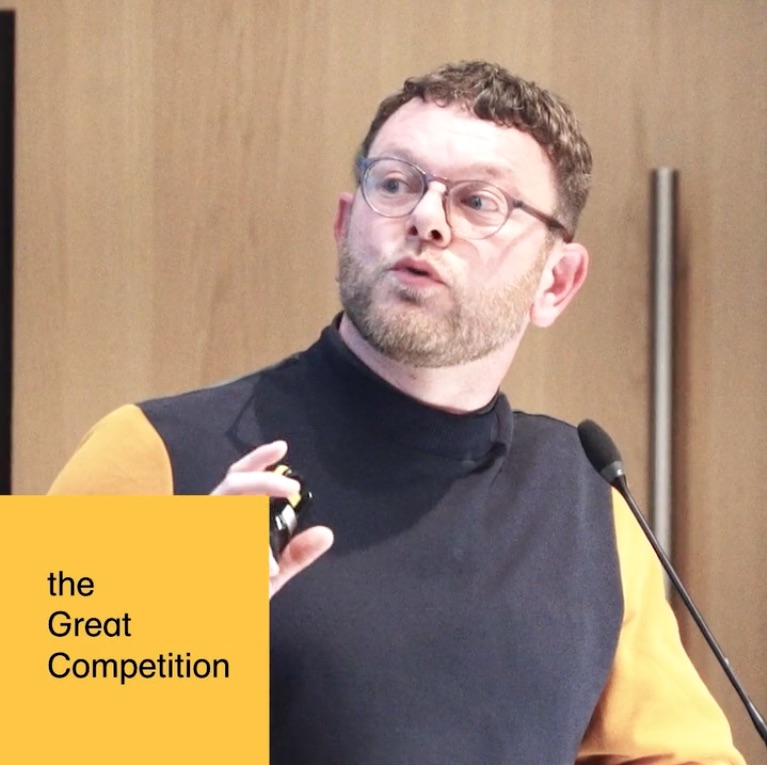
Branching out: LSBU research fellow tours universities UK-wide to promote The Great Competition
Thomas Empson, LSBU research fellow and doctoral researcher, encourages students across the country to take part in the new national design challengeThe Great Competition, designed for current undergraduates, aims to promote greater industrial innovation by encouraging students to develop solutions to today’s most pressing social and environmental issues.
This year, candidates are invited to respond to an industry-led live brief on sustainable manufacturing, inspired by the UK Government’s Industrial Society. A judging panel of leading experts across design, engineering and related fields will select the shortlisted and winning submissions. Shortlisted submissions will have the opportunity to take part in a designer-led masterclass and Awards ceremony in May 2019. The winning submission/s will also receive a cash prize of up to £3,000.
As the competition’s Project Facilitator, Thomas hopes to recruit as many students as possible to contribute; over 60 LSBU students are on board, and hundreds more from universities across the country. We interviewed Thomas to find out more about the competition and why he decided to get involved.
How did you become involved in the Design Museum’s, ‘The Great Competition’?

"I’d worked with the Design Museum last summer to run a Continued Professional Development (CPD) day for higher education lecturers. The CPD day was about utilising gallery space as a point of inspiration for contextual studies and lectures.
At that time, the learning team mentioned their plans to run a higher education competition for engineering. So, I kept an eye on their website for the advert and, on reading the spec, applied for the appointment.
Why did you decide to take part?
"When I read the job description and the synopsis about the competition, it was strongly aligned to my current field of research - so applying was a no brainer. The competition focuses on sustainability and engineering, as does my PhD. When I was invited to the interview, I was able to discuss my work with the Design Museum’s Head of Learning: Sevra Davis. With such strong synergy between the competition’s ambitions to promote cross-disciplinary innovation and my own work, I was appointed in the role. I was excited by the opportunity to collaborate in my subject area with such high profile institutions as the Design Museum and the Royal Commission for the Exhibition of 1851.
After being appointed, I’ve help develop the competition brief in collaboration with the Learning Team and was asked to speak at the launch event at the Design Museum in November (picture). I’ve been developing the outreach lecture and will be going up to a number of UK universities over the coming months to give a keynote lectures that contextualise the need for sustainable solutions amidst humanity’s increasing demand on Earth’s natural resources which overshoot what the planet can replenish.
Within this role I’ve been able to draw on my past experience as a lecturer in entrepreneurship, creativity and innovation, whilst bringing in to focus my new areas of knowledge; engineering and sustainability."
You’ve mentioned this ties in really well into the PhD paper you are writing; how so?
"My doctoral research is about global challenges, sustainable development and engineering. I am looking to understand how engineers can better support industrial growth through sustainable solutions. This was a very new subject to me as my background was in communications, entrepreneurship, innovation and marketing, but in 2017 I made a conscious decision to change the direction of my profession to align with how we as humanity need to move forward and progress.
After several months reading about various subjects, including: the UN’s Sustainable Development Goals; creative theory and frameworks; engineering research and academic case studies; industrial advancements thought the first three industrial revolutions and also looking at predictions for the forth, I have managed to scope out a body of doctorial research that leans on my strengths in understanding creativity and conjoining it with what’s required from the engineering industry under the context of the global challenges. The global challenges include population growth, resource depletion and climate change – all which need to find a sustainable balance."
What is the outcome you want to see from the Great Competition?
"Ultimately, I want to see more engineers and designers thinking about sustainability as a core part of their practice and projects. I hope my outreach lectures will inspire the next generation of engineers and designers to think about sustainability as central to everything they do as opposed to a superficial add-on or project after thought. When the word sustainability becomes redundant as it is the norm – then we’ve truly got there – but we are still building on the bad habits and practices of the past so it will take time.
As well as seeing great ideas about sustainable solutions, individuals are encouraged to think about concepts as scalable business solution– a novel idea is not enough unless it can be put into practice in the real world.
With regards to competition entries, it will ultimately be up to the judges to choose a winner. They will have their own ideas of what is best. However, I always think judges want to be surprised by the ideas they see - from solutions to really complex issues - communicated clearly, to simple ideas not yet thought of but that can be clearly actioned and implemented."
Interested in joining The Great Competition? Register your interest.
Follow Thomas and The Great Competition on Twitter to keep updated.
Featured image (above): Beazley Designs of the Year 2018, courtesy of the Design Museum.